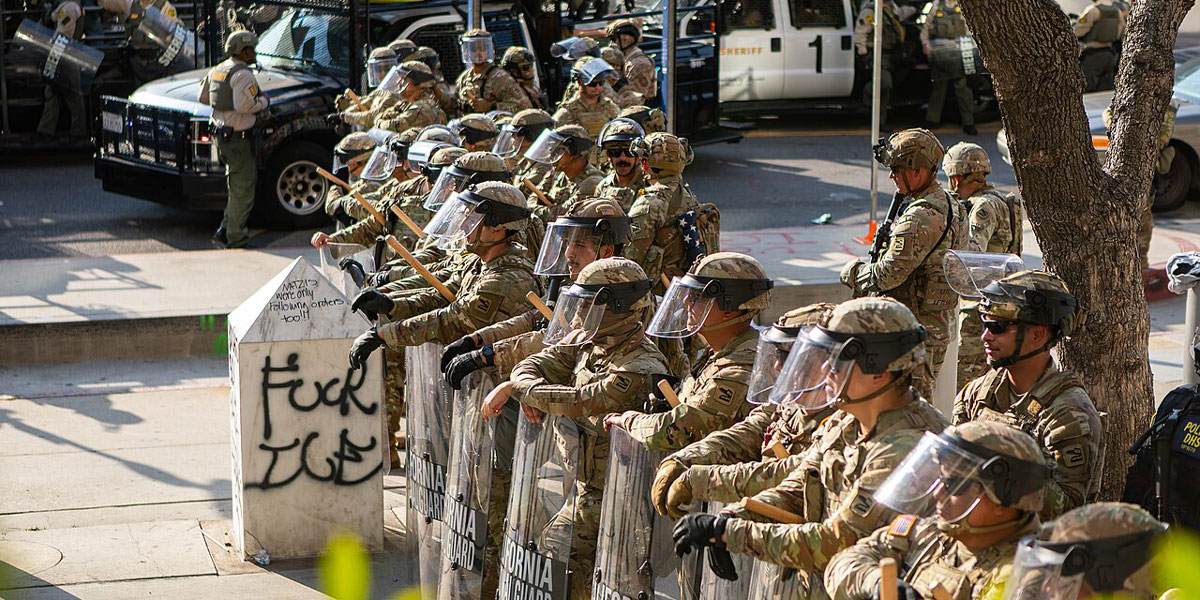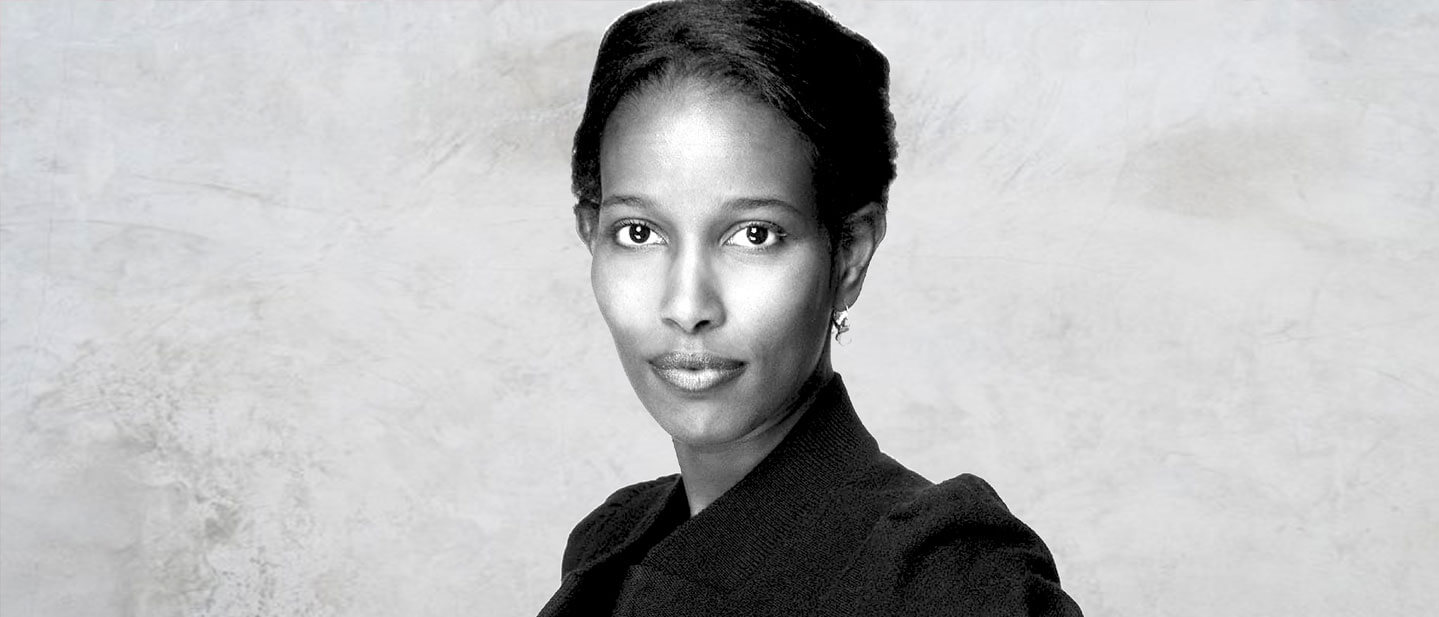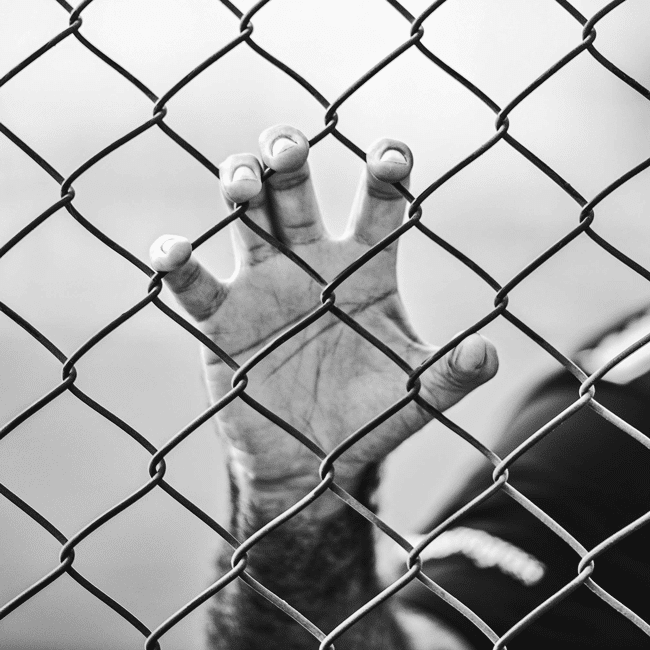
Lessons from Los Angeles: Ethics in a declining democracy
Opinion + AnalysisPolitics + Human Rights
BY Dr. Gwilym David Blunt 17 JUN 2025
The first two weeks of June 2025 have seen dramatic demonstrations in the United States against the Trump administration.
Against the backdrop of the President’s campaign of mass deportation, federal agents staged raids at a Home Depot and garment factories in Los Angeles. This triggered spontaneous and sometimes violent protests. Amidst television coverage giving the impression of widespread lawlessness, President Trump deployed some 4,000 members of the California National Guard and 700 U.S. marines – this was done despite the objections of Governor Gavin Newsom, LA Mayor Karen Bass, and the LA Police Department.
This is not unprecedented, but this was the first time troops were deployed on the streets of an American city since the 1992 LA Riots. It was also the first time since 1965 that the Guard was deployed over the objections of a state governor since Lydon Baines Johnson used them to protect citizens marching for civil rights in Alabama.
However, the context matters. These protests in LA in no way matched the scale of the LA Riots of forty years ago, which effectively shut down the city. In 2025 people were still travelling to work; Angelinos were posting photos of family fun from Disneyland. Secondly, Baines Johnson felt the necessity of nationalising the Guard in Alabama because of a widespread organised racist campaign of intimidation against civil rights activists. The was no comparable deprivation of rights in LA (possibly excepting the climate of fear created by Immigration and Customs Enforcement (ICE) agents in the city’s Latino population).
The president has these powers, but they are expected to use them within the norms of ‘democratic restraint’ – they should only be used when there is great urgency. This was plainly not the case, considering the LA protests were effectively contained by the LAPD. Governor Newsom delivered a televised address in which he accused Trump of undermining the norms and institutions of democratic government in the United States and that California was being used to test a broader authoritarian power grab.
America is showing many of the signs of ‘democratic backsliding’. In How Democracies Die, political scientists at Harvard, Steven Levitsky and Daniel Ziblatt, have identified symptoms of a dying democracy. Many people think of military coups and tanks on the streets, but democracies often have slower, less spectacular deaths. Levitsky and Ziblatt show that elected leaders manage to neutralise and co-opt other branches of government; we have seen this with the collapse of moderate voices in the Republican Party and many express deep reservations about the Supreme Court’s independence after the genuinely shocking ruling for Trump v. United States which effectively placed the president above the law.
It is not just the institutional stress, but the growing incivility of civil society that is a concern, because institutions and constitutions do not defend themselves. They require people to unite to support common ways of life.
Americans are now deeply polarised. Political opponents are no longer competitors but enemies, or even traitors, to be silenced. It is impossible to disassociate this from the global pandemic of social media brain rot spreading disinformation, hatred, and conspiracy theories. The erosion of checks and balances coupled with the polarisation of civil society has enabled democratic norms to be slowly eroded to the extent that the President feels able to govern without traditional restraint.
So then what are the duties of citizens in a democracy that, if not dying, is looking terribly ill? This is not a partisan issue, but one that addresses the basic structure of society.
John Rawls wrote in A Theory of Justice, perhaps the greatest work of American political philosophy, that we all have a ‘natural duty’ to build and uphold just social institutions. This is because these institutions are the condition by which we can exercise our minimal autonomy. There is an assumption here that there is something intrinsically valuable about being able to think up and pursue one’s idea of a good life (so long as it doesn’t step on other people’s ability to do the same). You cannot do this if your choices are contingent on the will of a powerful person, whether it is your boss or the president. This is why the founders of the United States opted for a republic over a monarchy as the best guarantee of freedom from domination. It is a matter that should concern all Americans regardless of their political preferences.
Yet, it is a fragile system. On the last day of the Constitutional Convention in 1787, Benjamin Franklin was asked by his friend Elizabeth Willing Powel whether the United States was to be a monarchy or a republic, to which he replied, “a republic if you can keep it”. It is easy to imagine states, especially ones as powerful as the United States, as permanent, but history is a graveyard of states, including many democracies.
What then are citizens to do in circumstances where democracy is failing? We find a suggestion in Franklin’s words. It is up to the people. What makes Franklin’s quote so interesting is that he addressed it to someone who could not even vote: a republic if you can keep it. The suggestion being that all people, even the disenfranchised, share this natural duty to preserve and uphold just institutions. The addressee of Franklin in the 21st century could well be the illegal immigrants who despite being demonised are an integral part of the American economy and society. The protests in LA may have been alarming, but they were a distress call from some of the most vulnerable people in the United States.
The question is how long can this continue? The problem with socialism, Oscar Wilde quipped, is that it takes up too many evenings. The same can be said about resisting authoritarianism. People need to live their lives, you can’t spend every waking hour protesting. Authoritarians know this and take their time eroding the guardrails and poisoning civil society. Trump with characteristic impatience is trying to do in months what took Viktor Orban and Hugo Chavez years to accomplish in much weaker democracies. The experience of the past two weeks may have chastened Trump, but it won’t stop him. The citizens of the United States are in a race against autocracy, but it is not a sprint. It is a marathon.
What every person in the United States, both citizens and non-citizens, must ask themselves is how best can I exercise my natural duty to support just institutions when they are under threat? It is an imperfect duty, meaning that it can be cashed out in numerous ways, but here are 3 suggestions:
- Vote for democracy: In instances of authoritarian capture people must put country above party. When a mainstream party, either of the left or the right, is infected by authoritarianism it is time to find a new political home until the fever breaks.
- Depolarise your politics: Democracies die when people lose what philosopher Michael Oakeshott called a ‘common tongue’ – the shared practices and customs that turns strangers into compatriots. Just as some people must make a new political home, others have a duty to welcome them. Your neighbour is not your enemy, even when you disagree.
- Take it to the streets: Vocal and visible rejection of authoritarianism by a united front reminds people that the decline of democracy is not inevitable; think of the contrast between the aptly named “No Kings” protests and Trump’s farcically shabby birthday parade. Public defiance is essential to maintain the health of civil society.
And it should also be said all of us observing from the sidelines must ask ourselves how we can exercise the same duty to prevent our democracies from going the same way.

BY Dr. Gwilym David Blunt
Dr. Gwilym David Blunt is a Fellow of the Ethics Centre, Lecturer in International Relations at the University of Sydney, and Senior Research Fellow of the Centre for International Policy Studies. He has held appointments at the University of Cambridge and City, University of London. His research focuses on theories of justice, global inequality, and ethics in a non-ideal world.
Ethics in your inbox.
Get the latest inspiration, intelligence, events & more.
By signing up you agree to our privacy policy
You might be interested in…
Opinion + Analysis
Politics + Human Rights
Unrealistic: The ethics of Trump’s foreign policy
Big thinker
Politics + Human Rights
Big Thinker: Ayaan Hirsi Ali
Opinion + Analysis
Politics + Human Rights, Health + Wellbeing, Society + Culture
I changed my mind about prisons
Opinion + Analysis
Politics + Human Rights, Relationships




